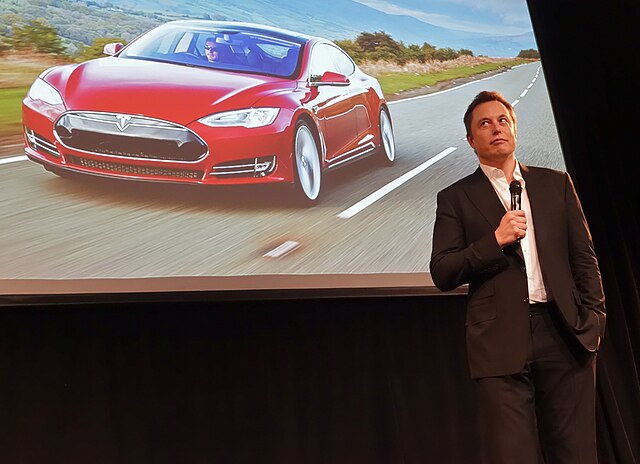When it comes to satirical dissent, London is not, and never has been shy. It’s a city where nappy-wearing Donald Trump inflatables fly over Parliament, where people dress as turds to protest a council that can’t clean up its own shit, and where a clown convinced half the UK to leave Europe, oh wait, that wasn’t satire. Buffoonery aside, if there’s one thing London does consistently well, it’s mockery as a civil tradition.
Lately, though, the city has surpassed itself, graduating from headline grabbing high-jinks to calculated, viral comedy gold. Not because the issues are any less serious, on the contrary, but because the target—one Elon Musk—is begging to be ridiculed.
Over the past few weeks—and in direct response to Musk’s increasingly desperate lurch to the far right, his fascist salute photo-op, DOGE, and his ongoing display of slimy billionaire entitlement—activists have launched a series of polished stunts aimed squarely at his most visible asset, Tesla.
As well as the appearance of “Swasticar” stickers and “Musk-B-Gone” air fresheners, London bus stops and Tube carriages have been hijacked with high-gloss, high-punching mock-ads strapped with lines like “Now With White Power Steering” and “The Fast and the Führer”. Groups like Led By Donkeys, Takedown Tesla, and Everyone Hates Elon are executing increasingly coordinated actions, with the latter even inviting the public to smash a second-hand Tesla in the name of art (and catharsis). It’s guerrilla meme-fare for the man who once profoundly declared “I am meme”.
But while the targets—electric cars and a Mars-obsessed CEO—are relatively new, fascism, notably, is not. And neither are the activists’ tactics. Satirical dissent has long been an important force in revealing truth and engaging an apathetic public in politics and debate around the world.
The Situationist International (SI), an international organisation of social revolutionaries, called it détournement, or the hijacking of the symbols of dominant culture by twisting them into critique. Turn the ad into an attack, the brand into a punchline and use public space as a stage for dissent.
It’s a spirit that has surfaced again and again. In the UK, Space Hijackers, a group of self-described “anarchitects” once attempted to bring a tank to a G20 protest and on another occasion listed the London Olympics on eBay. And in Paris, Jeudi-Noir turned squatting into protest performance, occupying luxury flats and holding press conferences from balconies to spotlight the absurdity of housing injustice in a city with thousands of empty high-end properties.
More notably, it’s a philosophy seen through the actions of the Yippies in the 1960s, a famous group of activists who also treated politics like street theatre. Knowing shouting wasn’t enough, they made protest impossible to ignore. They levitated the Pentagon (or tried to) and nominated a pig for president as a kind of pre-internet shitpost.
Which brings us neatly back to a man who has, in recent months, become more famous for his shitposting than his rockets to Mars—rockets which, like Tesla stock, have been in freefall. According to the Financial Times, Tesla has just recorded its worst quarter since 2022, with vehicle deliveries down 13%. It’s the sharpest decline in the company’s history and analysts aren’t just blaming market competition or supply chain issues, they’re pointing to the increasingly radioactive brand of Elon Musk himself.
This shows the cultural and financial unravelling hasn’t happened in isolation. It’s been accelerated by the new wave of activist groups who’ve realised that in an age when power is performative, sometimes protest has to be too. Some might argue satirical activism makes reality and the struggles we face feel unserious—but when a 53-year old billionaire CEO can tank his company’s stock with a meme, desperately pretend to be good at video games, tweet fascist dog-whistles and conspiracy theories, and still be treated as a visionary, it’s not the protest that’s absurd, it’s the context. In that landscape, satire isn’t a sideshow, it’s a translation. A form of dissent that meets chaos with clarity and spreads faster than investor panic at a Tesla earnings call.
Note: one of the actions mentioned in the article – the smashing of the Tesla – is scheduled to take place on April 10th.




